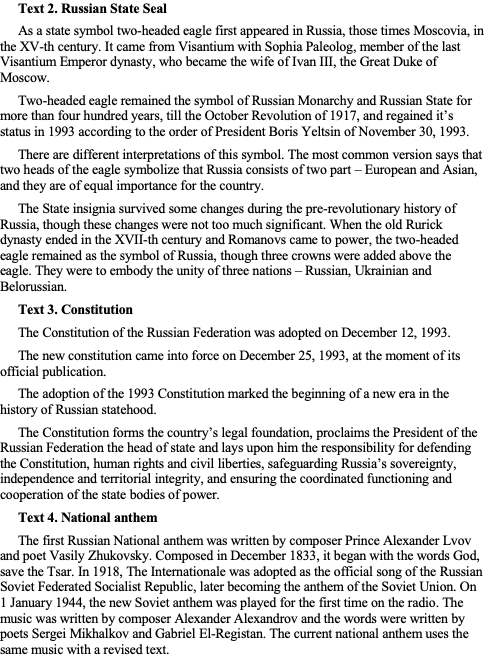2 курс.
State System of Russia
Russia is a parliamentary republic. Head of State in this country is the President. The government consists of three branches: legislative, executive and judicial. The President controls each of them.
The legislative power is exercised by the Federal Assembly. It consists of two chambers: the Council of Federation and the State Duma. Each chamber is headed by the Speaker. A bill may be introduced in any chamber. A bill becomes a law if it is approved by both chambers and signed by the President. The President may veto the bill. He can make international treaties. The President may also appoint ministers; the Federal Assembly approves them. The members of the Federal Assembly are elected by the people for four years.
The executive power belongs to the Government, or the Cabinet of Ministers. The government is headed by the Prime Minister.
The judicial power belongs to the system of courts. It consists of the Constitutional Court, the Supreme Court and other courts.
The national symbol of Russia is a white-blue-and-red banner. The hymn of Russia is «The Patriotic Song» by M. Glinka.
Topical Vocabulary
Answer the questions:
- What branches does the Government consist of?
- What is the legislative power exercised by?
- How is a law made?
- What body does the executive power belong to?
- What does the system of courts consist of?
- What are the national symbols of Russia?
Translate into English:
- Глава парламентской республики России - президент.
- Законопроект становится законом, если президент не наложит на него вето.
- Законопроект должен быть одобрен обеими палатами и подписан президентом.
- Исполнительную власть представляет кабинет министров, возглавляемый премьер-министром.
- Судебная власть осуществляется Конституционным судом, Верховным судом и другими судами.
